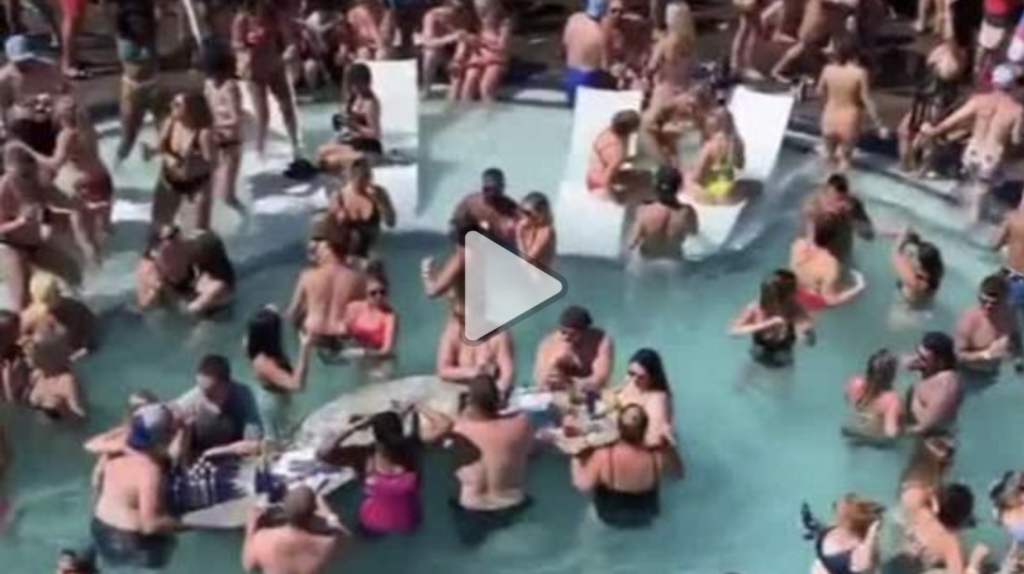Take a look at this crowded bar Memorial Day weekend at Lake of the Ozarks.
I’m going to assume that most of the people in this picture are drinking. I’m also going to assume that some of the people in this picture will leave this party intoxicated yet believe they’re ok to drive. I’m going to assume every single person in this picture arrived home safely.
What would your conclusion be if all the above were true? Would you conclude that because none of the intoxicated people in this crowd got into a car wreck afterward, that drunk driving is ok? Would you think that maybe we don’t need laws forbidding drunk driving? Or, would you conclude that the intoxicated drivers were damned lucky, because intoxicated driving clearly increases your chances of causing an accident and killing yourself and others?
Here’s another possible outcome: One of the men driving home was pretty hammered. After getting onto the highway, he realized that he shouldn’t be driving. He kept losing his focus and had some trouble staying in his lane. When he arrived home, he breathed a sigh of relief. No harm, no foul. Unbeknownst to this man, a woman driving in the lane next to him on the highway was trying to get home from her shift at the hospital. She was a nurse tired from another long day. When his car drifted over into her lane, she was forced to swerve, causing her car to roll down an embankment. She is severely injured and may not survive.
The man who is breathing a sigh of relief that he got home safely, he has no idea what his actions caused. He may never know.
Now let’s look at this picture again, knowing this photo was taken during the pandemic. It’s entirely possible that everyone left this bar feeling good and that all of them continue living a healthy happy life. It’s quite possible, however, that two or three of these people at the bar were infected but had no symptoms. It’s also entirely possible that one of these asymptomatic people talked to three other women while waiting in line in the crowded ladies’ room. As they laugh about the goofy bartender, some infected droplets spray from her mouth and onto the others. After they go home, two of them get sick. Before one of them had symptoms, she visited her elderly mother a few days later. Her mother ended up on a ventilator and died a week later.
I keep hearing, “everyone is going to die of something.” That’s 100% true. A lot of people die in car accidents, with or without intoxication involved.
But the reason we enact laws for public safety is to reduce the risk of harming or killing other people. Wearing a mask in public during a pandemic is as practical and important as NOT drinking and driving, or taking the keys away from someone who drank too much.
Wearing a mask in public is like taking the car keys away from someone who drank too much.
There’s an even more compelling reason to social distance and wear a mask. The man who got home safely, may wake up the next morning and recognize how lucky he is. He may vow to never again drink and drive. Should that happen, he will never have or cause a wreck due to intoxication.
The woman who unknowingly passed the virus to the ladies in the restroom may see how quickly it’s spreading in her community and decide she’s now going to be more careful. She vows to keep a social distance, wear a mask in public, and do what she can to keep others safe. Even if she does that starting now, the people she infected last night can continue spreading the virus, exponentially. The two people she infected can spread it to four, and those four can spread it to eight and so on.
So why would we intervene to prevent death by drunk driving but not intervene to prevent death by social distancing and wearing masks in public? In 2019, “only” about 10,000 people died as a result of drunk driving, but most of us feel compelled to strictly enforce the law to prevent those needless deaths. No one complains about the government violating their constitutional rights by enacting drunk driving laws.
As I finish writing this article, ten times as many people, more than 100,000 people, have died as a result of COVID-19 in just few months, with many other people barely hanging on. It’s far more deadly than drunk driving.
—
The above video is on Snapchat in the Lake of the Ozarks? Unreal. What are we doing?
— Max Baker (@maxbaker_15) May 24, 2020



Renée: This willingness to crowd together in the pool during the pandemic seems to illustrate the power of framing. It would seem that lives are fungible–protecting a life on the highway would seem to be the moral equivalent of protecting someone from COVID-19. But maybe it’s not that simple. Maybe we can more vividly imagine the screeching tires, the crunching metal, the screams and the smell of things burning. Because we have basic level experience with the horror of crashing cars, it provokes us to do what we can to stop it from happening. Even those who drive while drunk think that drinking driving laws are appropriate in principle. COVID-19 is so tiny as to be invisible, so there is no basic level reaction to it. If only it were bigger, like a wasp, we might react to the danger of it better. But because it is silent and invisible, maybe it easy to pretend that it isn’t really a big deal.
I’ve struggled to understand why those people in the pool would take these risks. I’ve sketched out some ideas here: https://dangerousintersection.org/2020/05/26/contemplating-the-covid-19-pool-party-at-lake-of-the-ozarks/
There is no cure for STUPID.